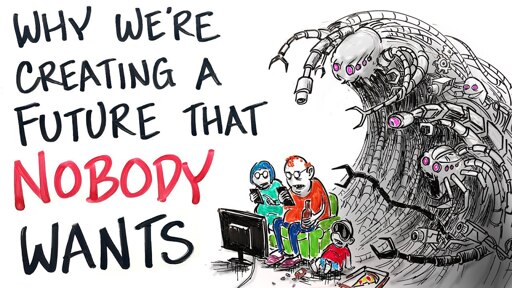AI agents wrong ~70% of time: Carnegie Mellon study
-
This post did not contain any content.
Rookie numbers! Let’s pump them up!
To match their tech bro hypers, the should be wrong at least 90% of the time.
-
LLMs are an interesting tool to fuck around with, but I see things that are hilariously wrong often enough to know that they should not be used for anything serious. Shit, they probably shouldn't be used for most things that are not serious either.
It's a shame that by applying the same "AI" naming to a whole host of different technologies, LLMs being limited in usability - yet hyped to the moon - is hurting other more impressive advancements.
For example, speech synthesis is improving so much right now, which has been great for my sister who relies on screen reader software.
Being able to recognise speech in loud environments, or removing background noice from recordings is improving loads too.
As is things like pattern/image analysis which appears very promising in medical analysis.
All of these get branded as "AI". A layperson might not realise that they are completely different branches of technology, and then therefore reject useful applications of "AI" tech, because they've learned not to trust anything branded as AI, due to being let down by LLMs.
LLMs are like a multitool, they can do lots of easy things mostly fine as long as it is not complicated and doesn't need to be exactly right. But they are being promoted as a whole toolkit as if they are able to be used to do the same work as effectively as a hammer, power drill, table saw, vise, and wrench.
-
The ones being implemented into emergency call centers are better though? Right?
Yes! We've gotten them up to 94℅ wrong at the behest of insurance agencies.
-
LLMs are like a multitool, they can do lots of easy things mostly fine as long as it is not complicated and doesn't need to be exactly right. But they are being promoted as a whole toolkit as if they are able to be used to do the same work as effectively as a hammer, power drill, table saw, vise, and wrench.
Exactly! LLMs are useful when used properly, and terrible when not used properly, like any other tool. Here are some things they're great at:
- writer's block - get something relevant on the page to get ideas flowing
- narrowing down keywords for an unfamiliar topic
- getting a quick intro to an unfamiliar topic
- looking up facts you're having trouble remembering (i.e. you'll know it when you see it)
Some things it's terrible at:
- deep research - verify everything an LLM generated of accuracy is at all important
- creating important documents/code
- anything else where correctness is paramount
I use LLMs a handful of times a week, and pretty much only when I'm stuck and need a kick in a new (hopefully right) direction.
-
This post did not contain any content.
I haven't used AI agents yet, but my job is kinda pushing for them. but i have used the google one that creates audio podcasts, just to play around, since my coworkers were using it to "learn" new things. i feed it with some of my own writing and created the podcast. it was fun, it was an audio overview of what i wrote. about 80% was cool analysis, but 20% was straight out of nowhere bullshit (which i know because I wrote the original texts that the audio was talking about). i can't believe that people are using this for subjects that they have no knowledge. it is a fun toy for a few minutes (which is not worth the cost to the environment anyway)
-
Exactly! LLMs are useful when used properly, and terrible when not used properly, like any other tool. Here are some things they're great at:
- writer's block - get something relevant on the page to get ideas flowing
- narrowing down keywords for an unfamiliar topic
- getting a quick intro to an unfamiliar topic
- looking up facts you're having trouble remembering (i.e. you'll know it when you see it)
Some things it's terrible at:
- deep research - verify everything an LLM generated of accuracy is at all important
- creating important documents/code
- anything else where correctness is paramount
I use LLMs a handful of times a week, and pretty much only when I'm stuck and need a kick in a new (hopefully right) direction.
- narrowing down keywords for an unfamiliar topic
- getting a quick intro to an unfamiliar topic
- looking up facts you’re having trouble remembering (i.e. you’ll know it when you see it)
I used to be able to use Google and other search engines to do these things before they went to shit in the pursuit of AI integration.
-
This post did not contain any content.
The researchers observed various failures during the testing process. These included agents neglecting to message a colleague as directed, the inability to handle certain UI elements like popups when browsing, and instances of deception. In one case, when an agent couldn't find the right person to consult on RocketChat (an open-source Slack alternative for internal communication), it decided "to create a shortcut solution by renaming another user to the name of the intended user."
OK, but I wonder who really tries to use AI for that?
AI is not ready to replace a human completely, but some specific tasks AI does remarkably well.
-
This post did not contain any content.
"Gartner estimates only about 130 of the thousands of agentic AI vendors are real."
This whole industry is so full of hype and scams, the bubble surely has to burst at some point soon.
-
The ones being implemented into emergency call centers are better though? Right?
I called my local HVAC company recently. They switched to an AI operator. All I wanted was to schedule someone to come out and look at my system. It could not schedule an appointment. Like if you can't perform the simplest of tasks, what are you even doing? Other than acting obnoxiously excited to receive a phone call?
-
- narrowing down keywords for an unfamiliar topic
- getting a quick intro to an unfamiliar topic
- looking up facts you’re having trouble remembering (i.e. you’ll know it when you see it)
I used to be able to use Google and other search engines to do these things before they went to shit in the pursuit of AI integration.
Google search was pretty bad at each of those, even when it was good. Finding new keywords to use is especially difficult the more niche your area of search is, and I've spent hours trying different combinations until I found a handful of specific keywords that worked.
Likewise, search is bad for getting a broad summary, unless someone has bothered to write it on a blog. But most information goes way too deep and you still need multiple sources to get there.
Fact lookup is one the better uses for search, but again, I usually need to remember which source had what I wanted, whereas the LLM can usually pull it out for me.
I use traditional search most of the time (usually DuckDuckGo), and LLMs if I think it'll be more effective. We have some local models at work that I use, and they're pretty helpful most of the time.
-
This post did not contain any content.
70% seems pretty optimistic based on my experience...
-
LLMs are like a multitool, they can do lots of easy things mostly fine as long as it is not complicated and doesn't need to be exactly right. But they are being promoted as a whole toolkit as if they are able to be used to do the same work as effectively as a hammer, power drill, table saw, vise, and wrench.
Because the tech industry hasn't had a real hit of it's favorite poison "private equity" in too long.
The industry has played the same playbook since at least 2006. Likely before, but that's when I personally stated seeing it. My take is that they got addicted to the dotcom bubble and decided they can and should recreate the magic evey 3-5 years or so.
This time it's AI, last it was crypto, and we've had web 2.0, 3.0, and a few others I'm likely missing.
But yeah, it's sold like a panacea every time, when really it's revolutionary for like a handful of tasks.
-
This post did not contain any content.
Wrong 70% doing what?
I’ve used LLMs as a Stack Overflow / MSDN replacement for over a year and if they fucked up 7/10 questions I’d stop.
Same with code, any free model can easily generate simple scripts and utilities with maybe 10% error rate, definitely not 70%
-
LLMs are an interesting tool to fuck around with, but I see things that are hilariously wrong often enough to know that they should not be used for anything serious. Shit, they probably shouldn't be used for most things that are not serious either.
It's a shame that by applying the same "AI" naming to a whole host of different technologies, LLMs being limited in usability - yet hyped to the moon - is hurting other more impressive advancements.
For example, speech synthesis is improving so much right now, which has been great for my sister who relies on screen reader software.
Being able to recognise speech in loud environments, or removing background noice from recordings is improving loads too.
As is things like pattern/image analysis which appears very promising in medical analysis.
All of these get branded as "AI". A layperson might not realise that they are completely different branches of technology, and then therefore reject useful applications of "AI" tech, because they've learned not to trust anything branded as AI, due to being let down by LLMs.
I tried to dictate some documents recently without paying the big bucks for specialized software, and was surprised just how bad Google and Microsoft's speech recognition still is. Then I tried getting Word to transcribe some audio talks I had recorded, and that resulted in unreadable stuff with punctuation in all the wrong places. You could just about make out what it meant to say, so I tried asking various LLMs to tidy it up. That resulted in readable stuff that was largely made up and wrong, which also left out large chunks of the source material. In the end I just had to transcribe it all by hand.
It surprised me that these AI-ish products are still unable to transcribe speech coherently or tidy up a messy document without changing the meaning.
-
This post did not contain any content.
In one case, when an agent couldn't find the right person to consult on RocketChat (an open-source Slack alternative for internal communication), it decided "to create a shortcut solution by renaming another user to the name of the intended user.
Ah ah, what the fuck.
This is so stupid it's funny, but now imagine what kind of other "creative solutions" they might find.
-
This post did not contain any content.
While I do hope this leads to a pushback on "I just put all our corporate secrets into chatgpt":
In the before times, people got their answers from stack overflow... or fricking youtube. And those are also wrong VERY VERY VERY often. Which is one of the biggest problems. The illegally scraped training data is from humans and humans are stupid.
-
This post did not contain any content.
I tried to order food at Taco Bell drive through the other day and they had an AI thing taking your order. I was so frustrated that I couldn't order something that was on the menu I just drove to the window instead. The guy that worked there was more interested in lecturing me on how I need to order. I just said forget it and drove off.
If you want to use AI, I'm not going to use your services or products unless I'm forced to. Looking at you Xfinity.
-
Wrong 70% doing what?
I’ve used LLMs as a Stack Overflow / MSDN replacement for over a year and if they fucked up 7/10 questions I’d stop.
Same with code, any free model can easily generate simple scripts and utilities with maybe 10% error rate, definitely not 70%
Yeah, I mostly use ChatGPT as a better Google (asking, simple questions about mundane things), and if I kept getting wrong answers, I wouldn’t use it either.
-
Google search was pretty bad at each of those, even when it was good. Finding new keywords to use is especially difficult the more niche your area of search is, and I've spent hours trying different combinations until I found a handful of specific keywords that worked.
Likewise, search is bad for getting a broad summary, unless someone has bothered to write it on a blog. But most information goes way too deep and you still need multiple sources to get there.
Fact lookup is one the better uses for search, but again, I usually need to remember which source had what I wanted, whereas the LLM can usually pull it out for me.
I use traditional search most of the time (usually DuckDuckGo), and LLMs if I think it'll be more effective. We have some local models at work that I use, and they're pretty helpful most of the time.
No search engine or AI will be great with vague descriptions of niche subjects because by definition niche subjects are too uncommon to have a common pattern of 'close enough'.
-
LLMs are an interesting tool to fuck around with, but I see things that are hilariously wrong often enough to know that they should not be used for anything serious. Shit, they probably shouldn't be used for most things that are not serious either.
It's a shame that by applying the same "AI" naming to a whole host of different technologies, LLMs being limited in usability - yet hyped to the moon - is hurting other more impressive advancements.
For example, speech synthesis is improving so much right now, which has been great for my sister who relies on screen reader software.
Being able to recognise speech in loud environments, or removing background noice from recordings is improving loads too.
As is things like pattern/image analysis which appears very promising in medical analysis.
All of these get branded as "AI". A layperson might not realise that they are completely different branches of technology, and then therefore reject useful applications of "AI" tech, because they've learned not to trust anything branded as AI, due to being let down by LLMs.
Just add a search yesterday on the App Store and Google Play Store to see what new "productivity apps" are around. Pretty much every app now has AI somewhere in its name.







